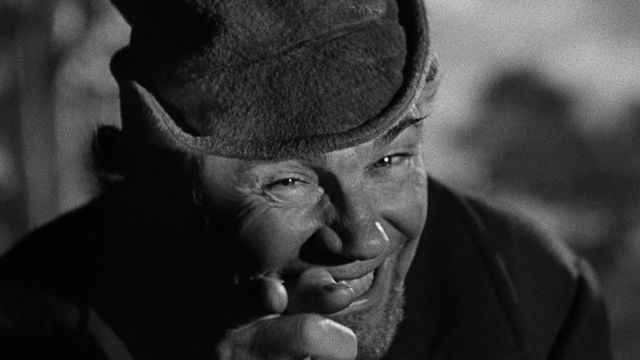
All That Money Can Buy
- This is a past program
Part of the UCLA Film & Television Archive’s 2022 UCLA Festival of Preservation screening series. Register at cinema.ucla.edu to attend this in-theater screening.
All That Money Can Buy (a.k.a. The Devil and Daniel Webster)
U.S., 1941
Set in 1840s rural New Hampshire, this Faustian gothic fantasy centers around down-on-his-luck farmer Jabez Stone (Edward Arnold), a man who has gazed into the eyes of disenfranchisement for far too long and has had enough. Amid his misfortune, his desperation leads him to a seven-year deal with the devil (an impish Walter Huston), known pseudonymously as “Mr. Scratch.” Though great success awaits Stone immediately following this cursed contractual relationship, his fortune is won only through a nimbus of darkness and greed that swiftly finds his life–and his moral center–unraveling. Adjacent to Stone is the plight of the lauded congressman and orator Daniel Webster, who too is being wooed by Mr. Scratch into selling his soul to win the presidency. It is the convergence of the lives of Webster and Stone that stretches their tale beyond its simplistic roots and into a knotty narrative that speaks volumes of the state of America at the start of a new decade.
Based on screenwriter Stephen Vincent Benet’s short story from 1936, All That Money Can Buy was the first independent production of German-born actor-turned-director William Dieterle, whose connections to the film’s themes date back to his turn in F.W. Murnau’s Faust (1926). In the States, Dieterle’s films would exhibit a particular flair for fantasy, with credits such as A Midsummer Night’s Dream (1935) and The Hunchback of Notre Dame (1939) proving him capable of a grounded allegorical sensibility.
Originally titled The Devil and Daniel Webster, RKO’s earlier release of The Devil and Miss Jones convinced the studio to jettison the title for the one you see on screen in this new restoration. This masterful production revels in the cinematic symbolism expressed by the innovative camerawork of Joseph August (Gunga Din, 1939; Portrait of Jennie, 1948), and is backed by an Academy Award-winning score by the great American composer Bernard Herrmann.
—Lauren Brown
DCP, b&w, 109 min. Production/Distribution: RKO Radio Pictures, Inc. Producer/Director: William Dieterle. Screenwriters: Dan Totheroh, Stephen Vincent Benet. Cinematographer: Joseph August. With: Edward Arnold, Walter Huston, Jane Darwell, Simone Simon, Gene Lockhart. Restoration funding provided by The Hobson/Lucas Family Foundation.
Restored by the UCLA Film & Television Archive and The Film Foundation in collaboration with Janus Films, The Museum of Modern Art and The Library of Congress. Laboratory services provided by Roundabout Entertainment, Inc., Fotokem, Audio Mechanics, DJ Audio, Inc.
News of the Day, Vol. 12, No. 258
U.S., 4/3/1941


